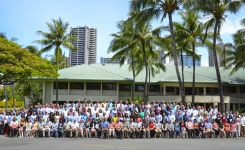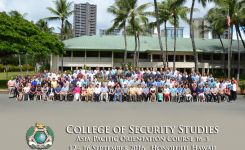- Daniel K. Inouye Asia-Pacific Center for Securi...
- 148 Fellows Gain an Expanded Understanding of R...
148 Fellows Gain an Expanded Understanding of Regional Issues in APOC 17-2
One hundred and forty-eight U.S. and international Fellows completed the Asia-Pacific Orientation Course (APOC) 17-2 June 23 at the Daniel K Inouye Asia Pacific Center for Security Studies in Honolulu. The five-day course included Fellows from Australia, Canada, Hong Kong, Japan, Malaysia, New Zealand, the Republic of Korea, Singapore, and Taiwan.
The APOC is designed to provide an overview of regional states and trends in the security, economy, politics, defense, environmental arenas. Faculty members address these areas in the context of the major sub-regions: Northeast Asia, Southeast Asia, South Asia and Oceania.
According to the Course Manager Professor Bill Wieninger, “the course focused on enhancing Fellows’ abilities to contribute to regional stability and conflict mitigation through enhanced understanding of the security challenges in the Asia Pacific’s and regional perspectives on the United States security policies.” The program also promoted building professional networks among Fellows.
To achieve this the course provided a diverse group of plenary presentations and electives, as well as SME-guided seminar discussions. APOC is one of six formal courses at DKI APCSS that follow a model of participant-centered learning.
The center is a Department of Defense institute that addresses regional and global security issues. Military and civilian representatives, most from the United States and Asia-Pacific nations, participate in a comprehensive program of executive education, professional exchanges and outreach events, both in Hawaii and throughout the Asia-Pacific region.
The Center supports U.S. Pacific Command by developing and sustaining relationships among security practitioners and national security establishments throughout the region. DKI APCSS’ mission is to build capacities and communities of interest by educating, connecting and empowering security practitioners to advance Asia-Pacific security. It is one of the Department of Defense’s five regional security studies centers.
Since opening in 1995, more than 11,000 alumni representing over 122 countries and territories have attended DKI APCSS courses and workshops.
For more photos of APOC 17-2, go to our Facebook album.
-END-



